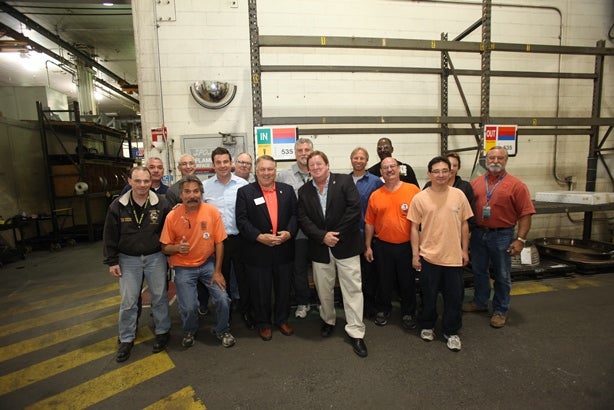News
United Mechanics Ratify National Agreement

Mechanics at United Airlines stations across the nation ratified a National Joint Collective Bargaining Agreement with the company after more than three years of negotiations.
More than 9,000 mechanics in the bargaining unit will see their compensation move to the top of the industry, marked improvements in leave and a unique industry reset, which will put the mechanics’ package 2 percent above the highest compensation in the industry every two years. Teamster members will also receive a signing bonus worth tens of thousands of dollars.
“This is a landmark agreement for the Teamsters,” said Jim Hoffa, Teamsters General President. “From the very beginning of the aviation industry, the Teamsters have been raising standards for workers. As a union, we’ve taken another step up.”
“This contract represents the largest contract for a mechanic group in airline industry history,” said Capt. David Bourne, Director of the Teamsters Airline Division. “It is a package worth a collective $1.7 billion in improvements in compensation and benefits over the current agreement. I’ve always said proudly that Teamster contracts are the strongest in the industry and this contract is one of our strongest ever. I’d like to thank International Representatives Clacy Griswold, Bob Fisher and Capt. Paul Alves and the entire negotiating committee for their hard work on this contract.”
Unity
Earlier in 2016, the company made an offer to the union that contained several provisions that were unacceptable to union officials and rank-and-file members. On Feb. 16, hundreds of Teamsters around the country began informational pickets and job actions at maintenance bases around the country, including key facilities in San Francisco, Orlando and Houston.
Demonstrating their power, the protests escalated two weeks later, expanding to airports in New York, Los Angeles, Cleveland, Newark and the Washington, D.C. area. During these protests, the mechanics engaged directly with United customers to inform travelers about their fight for a fair contract.
These protests continued for several months, with a large protest in New York City at an airline investor conference, and expanded to events where United is a corporate sponsor, including PGA Tour golf tournaments.
Counter-Proposal
During this time, the negotiating committee was crafting a counter-proposal that would address the union’s concerns and the mechanics’ actions brought the company back to the table with the National Mediation Board (NMB).
Following several summer sessions, an agreement-in-principle was reached on Aug. 12 that outlined the economic scale of the contract.
The two parties went back to the table for several weeks to iron out the details of several articles. A tentative agreement was reached on Sept. 28 at the offices of the NMB. The entirety of the contract language was finalized on Oct. 8 and was shared with the membership electronically.
Airline Division officials and negotiating committee members went to every United station in the United States, including Guam, to answer questions from members about the improvements in wages, benefits and specifics in the contract language.
Voting took place from Nov. 14 through Dec. 5 via telephone and internet balloting. More than 87 percent of eligible voting mechanics participated in the election, reflective of the high level of engagement that Teamster members invest in their workplaces, their unions and their civic lives.
“This contract was possible because of the solidarity we demonstrated shift-to-shift and station-to-station,” said Joseph Prisco, a 27-year mechanic at United Airlines and a member of the United Airlines negotiating committee.
“As mechanics, we’re taught to work as a team to accomplish the important goal of aircraft safety. Using that same team concept, we stuck together with professionalism, solidarity and purpose to get an industry-leading contract.”
The agreement took effect upon its ratification on Dec. 5 and will run for six years.